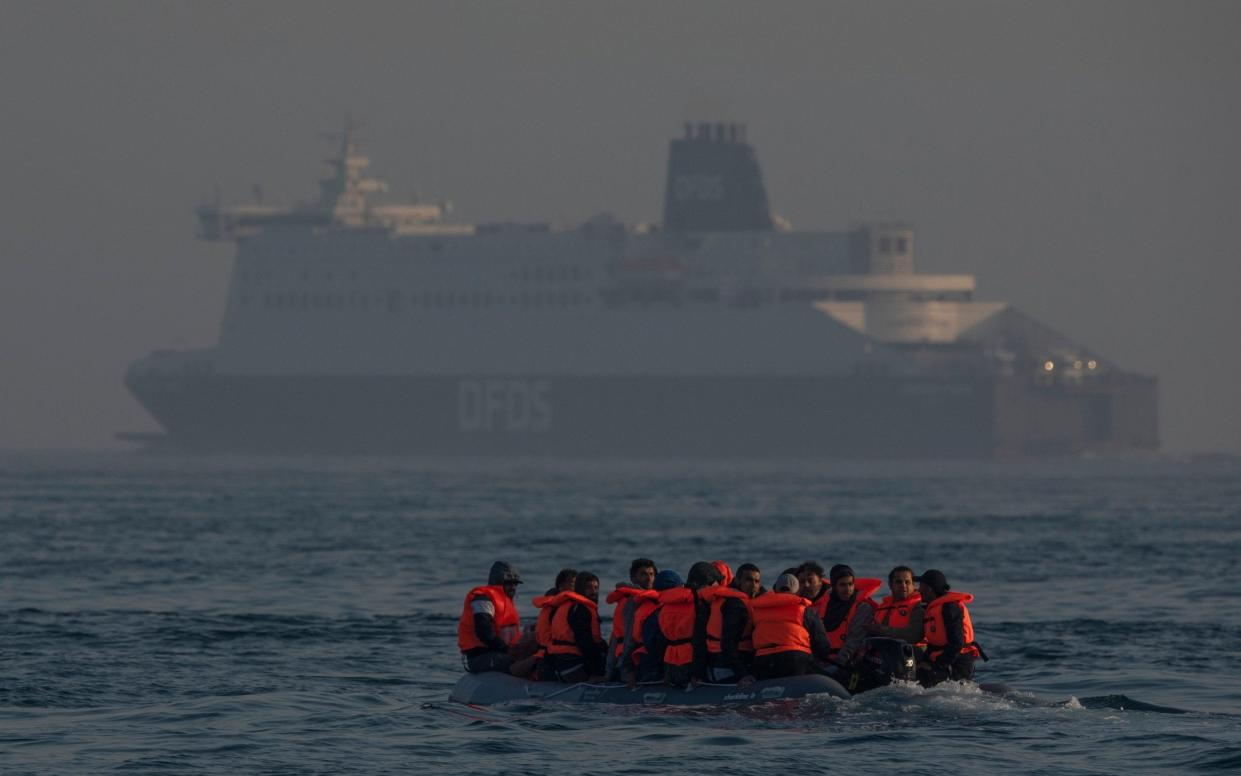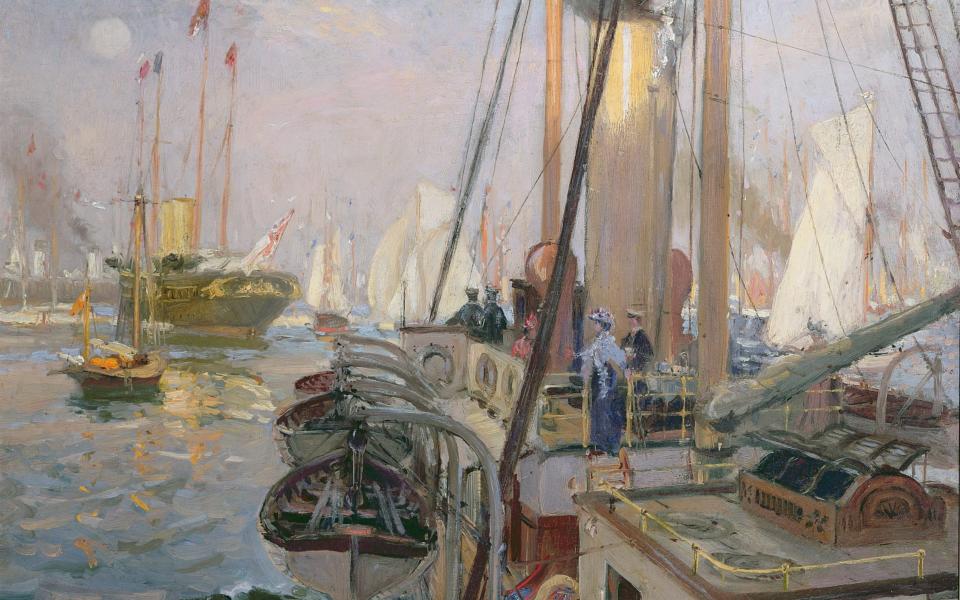Letters: Migrant vessels must be made to conform to commercial standards

SIR – The French say that they cannot stop a migrant boat unless it is in distress. If these were private boats, this could be true. However, the migrants pay for their passage, which makes the voyage a commercial operation. These commercial vessels must therefore meet the standards required to conform with safety rules. The person in charge is also required to hold a certificate of competence.
If a vessel is stopped and fails the inspection, it should be escorted to the nearest port in France.
James A Cowan
Belmont, Co Durham
SIR – Among all the discussion about the huge number of migrants arriving from France in small boats, there is no mention of the Recreational Permit that is required for legal sailing in French waters. Why are French coastguards not stopping these boats to check that they have the correct permits, and returning them if not?
Neil Tungate
New Milton, Hampshire
SIR – Paying France millions of pounds to prevent migrants coming to the UK will not deal with the problem. These people have travelled for months from lawless countries and through other lawless countries to get to the English Channel. This is the last hurdle to freedom and, after what they have been through, this stretch of water is not going to stop them.
We should be sending a boat every day to the French coast to bring these migrants to the UK so that we have proper records of who is arriving. They could then be housed in reception centres and vetted before being passed into the communities.
Immigrants have been coming to England since at least the Viking days and they have helped to make this country what it is today. Today’s immigrants will also contribute over time and the skills they bring will make us even greater.
Ian Tunnicliffe
Broughton Astley, Leicestershire
SIR – Why does no one state the obvious – that no country really wants to provide food, accommodation and health services for economic migrants at the expense of its own population.
The French are happy to pass the problem on to the UK, and giving them money is not going to solve what is an intractable problem for the wealthy and liberal Western world.
Cathie Cox
Littleborough, Lancashire
SIR – Rather than wasting our money on hoping the French police will do something that is not in their interests, why not spend it stopping the supply of rubber boats in which the migrants cross the Channel?
I am also curious as to know what happens to the boats once they arrive on our shores.
Christopher Watkins
Herongate, Essex
SIR – I do not support the RNLI for it to act as an arm of the UK Border Agency.
Elizabeth Prior
London SW10
Pictures of decay
SIR – The government scheme to reward families for healthy eating via an app (report, July 24) would be complicated to administer and could prove costly for the taxpayer. It is also unlikely to receive much support from food retailers.
A much simpler idea would be to follow the successful example of putting pictures on tobacco products to cut smoking by putting pictures of decaying teeth on high-sugar food and drink. This would cost less to implement, and reducing sugar consumption would tackle both tooth decay and obesity.
Peter Wells
East Haddon, Northamptonshire
Tainted tap water
SIR – In our area the tap water (Letters, July 24) often has a strong and unpleasant chemical taste, which does not improve when it is boiled. This is why we always use bottled spring water when making tea or coffee.
Keith Temple
Winchester, Hampshire
SIR – In February 2020, the Monmouth water treatment works was flooded so Welsh Water distributed bottled water. I was so impressed by the quality of Brecon Carreg that I have bought it ever since.
Tap water here is perfectly safe, but it does have the taint of chlorine.
Thomas Hamilton-Jones
Monmouth
Clubland’s treasures
SIR – I was saddened to read of the auction of several silver items by the Athenaeum Club (Letters, July 22), including a kangaroo-foot cigar lighter.
There are a host of strange and remarkable treasures to be found within the bounds of Clubland, including a ram’s head snuff mull at the Caledonian, a suit of North African chain mail at the East India, and Napoleon’s death mask at Brooks’s.
Rev Sam Aldred
Swansea
Know your limits
SIR – The letters about speed limits (July 23) reminded me of my grandfather. As a child in the 1950s I remember him saying, when he was being driven in his Wolsey: “Twenty-five miles per hour is fast enough for any man.”
Marian Hughes
Milborne Port, Somerset
Church priorities
SIR – For more than three decades I have served my local parish church (Letters, July 23) in many capacities, including seeing through a building project to ensure our medieval church remains secure and watertight.
One of the saddest moments during my tenure as churchwarden was to lock our church at the outset of last year’s lockdown and pin up a notice to inform all visitors that it was closed for the foreseeable future. It went against everything it stood for, as an open and accessible place for prayer.
Throughout lockdown our vicar, lay readers, curate and associate priest worked ceaselessly to provide services on Zoom and to maintain our church community. Where were our bishops then and where are they now? Why are there so many of them when parish priest numbers are declining?
The Church of England’s hierarchy must wake up to the realities of small parishes and the endeavours of their sadly diminishing flocks to pay their parish share and keep our old and listed buildings open, warm and welcoming. We are currently on a downward slope which, if unchecked, will mean that parish churches like ours will eventually close for good.
Julia Cruse
Lamberhurst, Kent
RSPB and shooting
SIR – I agree with Ian Botham (Comment, July 23) about the RSPB’s vociferous and vitriolic stance on legal shooting. I resigned from it after 40 years of membership as it had become impossible for me to be a member and continue to work my gundogs. I joined the British Association for Shooting and Conservation instead.
Sandra Hancock
Starcross, Devon
Identity crisis
SIR – I too had a problem discussing my gas bill, which was registered in my husband’s name (Letters, July 23), and was told that he needed to contact them. Instead, I called back and said that I now identified as Derek Martin. That did the trick.
Debbie Martin
Princes Risborough, Buckinghamshire
SIR – I recently rang my online savings bank and, after answering all the security questions satisfactorily, I was informed that I had not passed and that my account was blocked. When I asked why I was told that due to “security reasons” they could tell me, and I was disconnected.
Calling back, I spoke to a supervisor who, after a 20 minute wait, said that I could now access my funds. The reason: “I sounded too young to be 72 but, after listening to my previous calls, they now believed I was me.”
Stephen Woodbridge-Smith
Tavistock, Devon
Blair’s new role
SIR – Tony Blair (Letters, July 19) appears like a sportsman turned commentator, whose summarising from the commentary box bears little resemblance to his time on the field.
Julian Hales
Saffron Walden, Essex
Flight of fancy
SIR – Stansted now charges £7 for drop off (report, July 23), going up to £25 if you exceed 15 mins.
With Ryanair offering £4.99 flights, who could have imagined that the flight would be the cheapest part of the journey?
Gill Taylor
Great Yeldham, Essex
The royal yacht should have echoes of Britannia

SIR – The new royal yacht (report, July 21) will clearly, in most respects, be very different from the previous one.
However, in appearance it is greatly to be hoped that it will closely match the supremely elegant lines of its predecessor, Britannia.
It is hard to see how that design could possibly be improved upon.
Alan Duncalf
Bampton, Devon
SIR – I agree with Jenny Jones (Letters, July 25) that many of us would feel proud to contribute towards the cost of the new royal yacht.
I bought tiles for our church roof and a boss for the inside, which made me feel that I owned part of the building. I am very much in favour of the new yacht and would love to feel like that about it.
Elizabeth Watson
Dorking, Surrey
English counties have their roots in cricket
SIR – Leanda de Lisle (July 21, telegraph.co.uk) writes in evocative praise of England’s historic counties. Yet one aspect of those counties she does not mention, but which adds considerable weight to a geographical structure that may otherwise baffle onlookers, is cricket.
Since the days of W G Grace, the game has been anchored on counties as well as traditional villages. Hence the County Championship, cricket’s first-class backbone, with caps worn and flags flown adorned by the county regalia, she describes.
John Kidd
Brisbane, Australia
SIR – I completely agree with Simon Heffer’s views on Hundred ball cricket (Sport, July 22). Just what does the ECB aim to achieve by starting this farcical competition?
Having played and enjoyed this wonderful, noble, game from the age of five to the age of 50, I am now losing interest in watching the style and behaviour of modern cricketers. The quiet, enjoyable game with polite applause has ceased to exist. Instead we have loud music and drunken chanting from people who attend but probably never play the game.
Sadly, county cricket is in decline and Test Match cricket is infrequent. Village and club cricket are fortunately still very popular, but Sunday cricket is also on the wane.
I do not believe changing the game is the answer, although we must continue to encourage young cricketers.
Charles James
Bognor Regis, West Sussex
SIR – It is a breath of fresh air to watch the Hundred men’s and women’s cricket, and most exciting not knowing who might win. Long may it continue.
Ian Philips
Mortimer, Berkshire
Letters to the Editor
We accept letters by post, fax and email only. Please include name, address, work and home telephone numbers.
ADDRESS: 111 Buckingham Palace Road, London, SW1W 0DT
FAX: 020 7931 2878
EMAIL: dtletters@telegraph.co.uk
FOLLOW: Telegraph Letters on Twitter @LettersDesk

